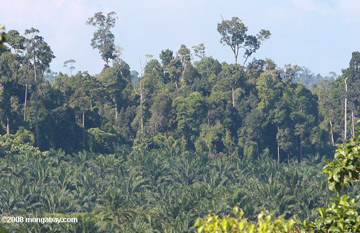EU’s sustainable biofuels push angers Malaysia, Brazil
mongabay.com
November 7, 2008
|
|
Eight developing countries threatened to file a World Trade Organization complaint against the E.U. for its proposed legislation to require imported biofuels to meet environmental standards, reports Reuters.
In a letter reviewed by Reuters, Argentina, Brazil, Colombia, Malawi, Mozambique, Sierra Leone, Indonesia and Malaysia called the requirements “unjustifiably complex” and said they would hurt their exports.
“They impose unjustifiably complex requirements,” the draft letter reportedly stated. “Some of our countries don’t exclude the possibility of defending their rights in the World Trade Organization, as a last resort.”
Under pressure from environmental groups and domestic biofuel producers, E.U. ministers have been considering measures to restrict imports of biofuels that fail to reduce greenhouse gas emissions relative to fossil fuels or result in social and environmental harm when produced. Producing nations — especially Malaysia, Indonesia, and Brazil — say the proposed legislation is an unfair trade restriction that favors biofuels produced in Europe and the United States.
 Oil palm plantation adjacent to rainforest in Malaysia. Research has shown that more than half of oil palm expansion in Malaysia and Indonesia since 1990 has occurred at the expense of natural forest. Oil palm is the world’s most productive oilseed, far outperforming rapeseed, soy, and corn as biofuel feedstocks. |
The European Commission recently unveiled a plan that would reduce its transport fuels target for biofuels produced from conventional feedstocks to four percent in 2015 and six percent in 2020. Despite the scaling back of its renewable fuels goals, the target would nevertheless dramatically expand European demand for biofuels. Seeing the potential, ministers from developing countries have been actively lobbying for access to the European market. Indonesia and Malaysia are hoping to supply the EU with biodiesel derived from palm oil, while Brazil aims to offer cane ethanol and soy biodiesel. Producing countries are facing off against environmentalists who say that while biofuels can offer a carbon savings relative to conventional fuels, many biofuels are produced unsustainably. Large swathes of forests, wetlands, and grasslands have been converted for biofuel feedstocks in recent years, while agricultural production has fouled waterways and exacerbated conflicts over land and abusive labor practices. The rush to biofuels has also been attributed to higher global food prices.
A decision by the EU on its biofuel regulations is expected before the end of the year.
Related articlees
Europe cuts biofuel targets to 4% in 2015, 6% in 2020
(9/12/2008) The E.U. voted to relax biofuels targets following widespread criticism of their social, economic, and environmental impacts. Thursday the European Parliament’s Industry and Energy Committee said it would push a plan calling for a 5 percent share of renewables in transport fuel by 2015 and a 10 percent target by 2020, a reduction from the 20 percent target set forth in March 2007. The plan effectively cuts targets for biofuels produced from conventional feedstocks to four percent in 2015 and six percent in 2020.
Biofuels 200 times more expensive than forest conservation for global warming mitigation
(8/27/2008) The British government should end subsidies for biofuels and instead use the funds to slow destruction of rainforests and tropical peatlands argues a new report issued by a U.K.-based think tank. The study, titled “The Root of the Matter” and published by Policy Exchange, says that “avoided deforestation” would be a more cost-effective way to address climate change, since land use change generates more emissions than the entire global transport sector and offers ancillary benefits including important ecosystem services.
Beyond high food prices, little to show for $11B/yr in biofuel support, says OECD report
(7/17/2008) Government support of biofuel production in rich countries is squandering vast amounts of amounts of money while exacerbating the global food crisis and failing to meaningfully curb greenhouse gas emissions and improve energy security, alleges a new report from the OECD, the club of industrialized nations.